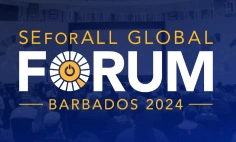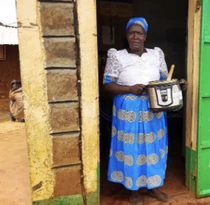Paul Hedrick (talk | contribs) mNo edit summary |
Paul Hedrick (talk | contribs) (Adding categories) |
||
| (8 intermediate revisions by 3 users not shown) | |||
| Line 1: | Line 1: | ||
{{GoogleTranslateLinks}} |
{{GoogleTranslateLinks}} |
||
| + | |||
| + | {{Updated|9|27|14}} |
||
==Events== |
==Events== |
||
| + | {{CalendarAndPastEvents}} |
||
| − | See [[Calendar of events]] |
||
| + | |||
==News and Recent Developments== |
==News and Recent Developments== |
||
*'''August 2006:''' Engineer [[Rodolfo Carrillo]] reports that solar box cookers are a great success in the plains of Venezuela. [[Cooperativa Wayne, R.L.]] developed a box-type solar cooker using aluminum obtained locally at low prices. The cooperative keeps track of every family that obtains a cooker, so that follow-up services can be provided. "The people that have gotten solar cookers are using them in an excellent manner," says Carrillo. People, mostly peasants, build their own cookers in the program and learn to both cook meals and [[Water pasteurization|pasteurize water]] with solar energy. The work of [[Cooperativa Wayne, R.L.]] has been covered by local and national newspapers. Other cooperatives have been in touch, seeking to spread solar cooking to their constituents. |
*'''August 2006:''' Engineer [[Rodolfo Carrillo]] reports that solar box cookers are a great success in the plains of Venezuela. [[Cooperativa Wayne, R.L.]] developed a box-type solar cooker using aluminum obtained locally at low prices. The cooperative keeps track of every family that obtains a cooker, so that follow-up services can be provided. "The people that have gotten solar cookers are using them in an excellent manner," says Carrillo. People, mostly peasants, build their own cookers in the program and learn to both cook meals and [[Water pasteurization|pasteurize water]] with solar energy. The work of [[Cooperativa Wayne, R.L.]] has been covered by local and national newspapers. Other cooperatives have been in touch, seeking to spread solar cooking to their constituents. |
||
| Line 22: | Line 25: | ||
''[Information for this section was taken originally from [[Media:sam.pdf|State of the Art of Solar Cooking]] by Dr. [[Barbara Knudson]]]'' |
''[Information for this section was taken originally from [[Media:sam.pdf|State of the Art of Solar Cooking]] by Dr. [[Barbara Knudson]]]'' |
||
| + | {{ArchivedPagesForHistory}} |
||
==Climate, Culture, and Special Considerations== |
==Climate, Culture, and Special Considerations== |
||
| Line 31: | Line 35: | ||
===External links=== |
===External links=== |
||
* [http://solarcooking.org/espanol/solarcooking-faq-span.htm Preguntas Frecuentes de la Cocción Solar] |
* [http://solarcooking.org/espanol/solarcooking-faq-span.htm Preguntas Frecuentes de la Cocción Solar] |
||
| + | ===Grupo de discusión Facebook=== |
||
| + | * [http://www.facebook.com/groups/251858061602590/ Cocinillas Solares sin Fronteras] |
||
| + | |||
===Audio and video=== |
===Audio and video=== |
||
| + | * [http://unradio.ultimasnoticias.com.ve/Programas/Especiales/La-cocina-solar.aspx La Cocina Solar] - ''UN Radio'' |
||
| − | * [http://www.tubeoli.com//list.php?q=COCINA+solar&filter=on Dozens of Spanish-language videos showing solar cooking activities] - ''TubeOli'' |
||
{{CountryContacts}} |
{{CountryContacts}} |
||
[[Category:South America]] |
[[Category:South America]] |
||
[[Category:Americas]] |
[[Category:Americas]] |
||
| − | [[Category:Countries |
+ | [[Category:Countries]] |
[[Category:Spanish-speaking countries]] |
[[Category:Spanish-speaking countries]] |
||
| − | [[Category: |
+ | [[Category:Venezuela]] |
Revision as of 19:01, 5 February 2015
|
Last edited: 27 September 2014
|
Events
Featured international events
- 4-6 June 2024 (Bridgetown, Barbados): Sustainable Energy for All Global Forum - The event will be co-hosted by Sustainable Energy for All (SEforALL) and the government of Barbados. It is a platform for government, business and finance leaders, entrepreneurs, and youth and community representatives from around the world to come together to broker new partnerships, spur new investment, and address challenges at the nexus of energy, climate, and development. More information...
Online events
- NEW: Thursday, 18 April 2024 (2:30pm-3:15pm EDT), (Washington, D.C., USA): ESMAP Spring Meetings Knowledge Café: Clean Cooking at the Heart of Energy Access - Join ESMAP for this exciting knowledge-sharing opportunity, which will showcase the role of clean cooking as a key part of energy access and energy transition. Presentations by René van Hell, Director of Inclusive Growth, Ministry of Foreign Affair, Netherlands, Dr. Kandeh Yumkella Chairman, Presidential Initiative on Climate, Renewable Energy and Food Security, Sierra Leone, and Chandrasekar Govindarajalu, Practice Manager, ESMAP, World Bank. In-person attendance at World Bank Atrium, MC Front Lobby is for Spring Meetings registrants only. However, you can watch the event online
Requests for proposal
- Decentralized Renewable Energy Solutions utilizing Solar and Bio-Energy - Sustainable Energy Technologies and Assessments of ScienceDirect, is requesting guest-author submissions. The special issue, VSI: DRES is devoted to publishing research articles reporting the innovative designs and design interventions in solar thermal and bio-energy for decentralized energy systems (DES). It includes i) new and novel designs of prototype or commercial devices and technologies, their development, modeling and simulations and experimental validation; ii) innovations for processes, techniques, utilization, and applications; iii) novel use of materials for improving efficiency, performance, techno-economic feasibility, and sustainability and iv) research findings addressing the socio-economic, health and safety impacts, and life cycle assessments leading to proposing novel devices for DES. The Deadline for submission is 31 July 2024. More submittal information...
- See also: Global Calendar of Events and past events in Venezuela
News and Recent Developments
- August 2006: Engineer Rodolfo Carrillo reports that solar box cookers are a great success in the plains of Venezuela. Cooperativa Wayne, R.L. developed a box-type solar cooker using aluminum obtained locally at low prices. The cooperative keeps track of every family that obtains a cooker, so that follow-up services can be provided. "The people that have gotten solar cookers are using them in an excellent manner," says Carrillo. People, mostly peasants, build their own cookers in the program and learn to both cook meals and pasteurize water with solar energy. The work of Cooperativa Wayne, R.L. has been covered by local and national newspapers. Other cooperatives have been in touch, seeking to spread solar cooking to their constituents.
- November 2003: Norvex, an ecological cooperative, is developing a solar cooking program whereby poor families in Venezuela receive instruction in the construction and use of solar box cookers. Seventy cookers have been constructed thus far with financial assistance from the German embassy in Caracas. The cookers primarily have gone to families in the Venezuelan outback and small coastal islands. In addition to cooking, solar water pasteurization is important in these rural communities where water is often contaminated. Former Solar Cookers International board member Shyam Nandwani, of Costa Rica’s Universidad Nacional, has provided technical assistance to this project. Contact: Asociacion Ecologica Norvex, Apartado No. 50092-1050, Sabana Grande, D.C., Caracas, Venezuela. Tel: 58-0414-839-2909, 0282-4-250584, e-mail: aguasay2001@yahoo.com
The History of Solar Cooking in Venezuela
Two small-scale efforts on the part of individuals to promote solar cooking are reported as having occurred in Venezuela. Carlos Manuel Mujica of Urban Fundalara demonstrates cookers and teaches others how to use them. Similarly, Flor Isabel Tur of the Centre por Desarrollo Y Ambiente (Development and Environment) uses cookers and holds workshops to teach others.
Currently, NORVEX, an ecological cooperative, is starting a solar cooking program for poor families in Venezuela. Financial assistance comes from the German embassy in Caracas. Families are taught how to construct and use the cooker, and how to pasteurize water. Seventy cookers had been made at the time of writing the news report, with most new solar users residing in rural areas where water is often contaminated. No information on future plans is available.
[Information for this section was taken originally from State of the Art of Solar Cooking by Dr. Barbara Knudson]
- Main article: History of solar cooking
Archived articles
Climate, Culture, and Special Considerations
Resources
Reports
Articles in the media
External links
Grupo de discusión Facebook
Audio and video
- La Cocina Solar - UN Radio
Contacts
The entities listed below are either based in Venezuela, or have established solar cooking projects there:
SCI Associates
- Main article: Solar Cookers International Association


